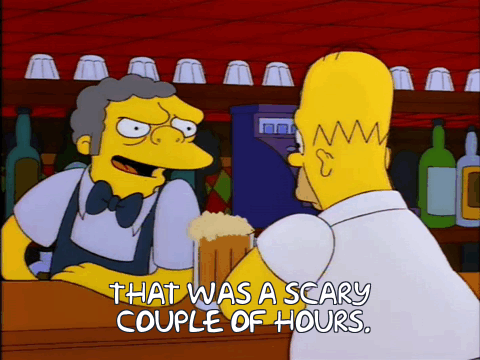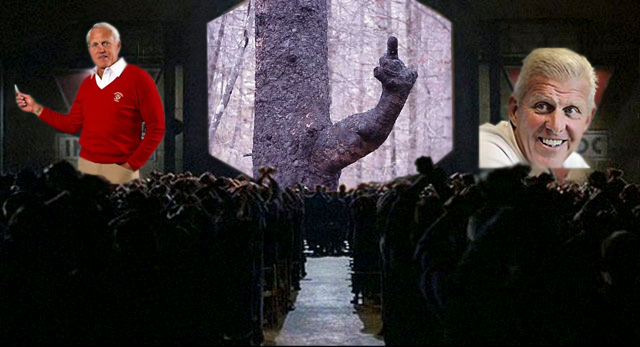
Welcome back, everyone
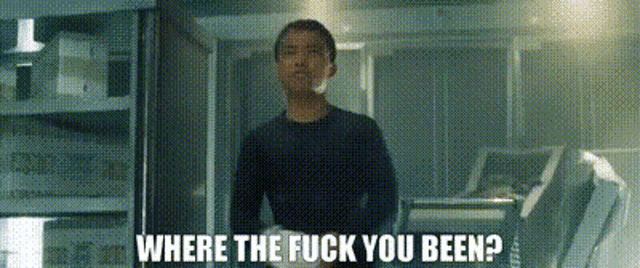
I hope you enjoyed yesterday’s history lesson. Today we dive into some modern history most of us are old enough to have vague recollections of.
If you’re talking the 80s, you have to go with these two.
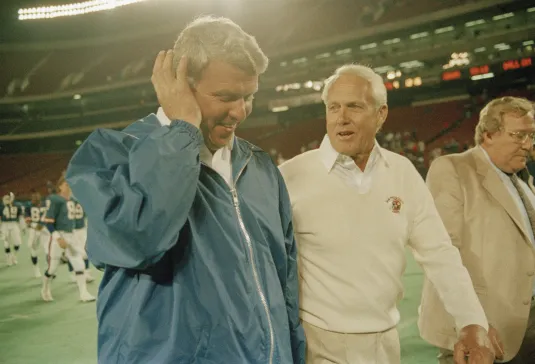
You can argue the case for a few others,

and I’ll give you some latitude, but when it comes to coaching tree offspring those two are the rulers of that universe.
[For you fans of the [Redacteds], I did briefly consider Joe Gibbs, but the fault with that lies in that it’s not so much a coaching tree but that he’s the centre of a coaching hourglass – Don Coryell & John McKay up top; Joe Bugel, Dan Henning, Richie Petitbon, and Arthur Smith down below. The sand starts off pretty great, but the pinch point in the middle is the fulcrum, because by the time it gets to the bottom you’re pretty frustrated, and sad because you wasted all that time watching it only to discover a combined record well-below .500.]
Bill Walsh,
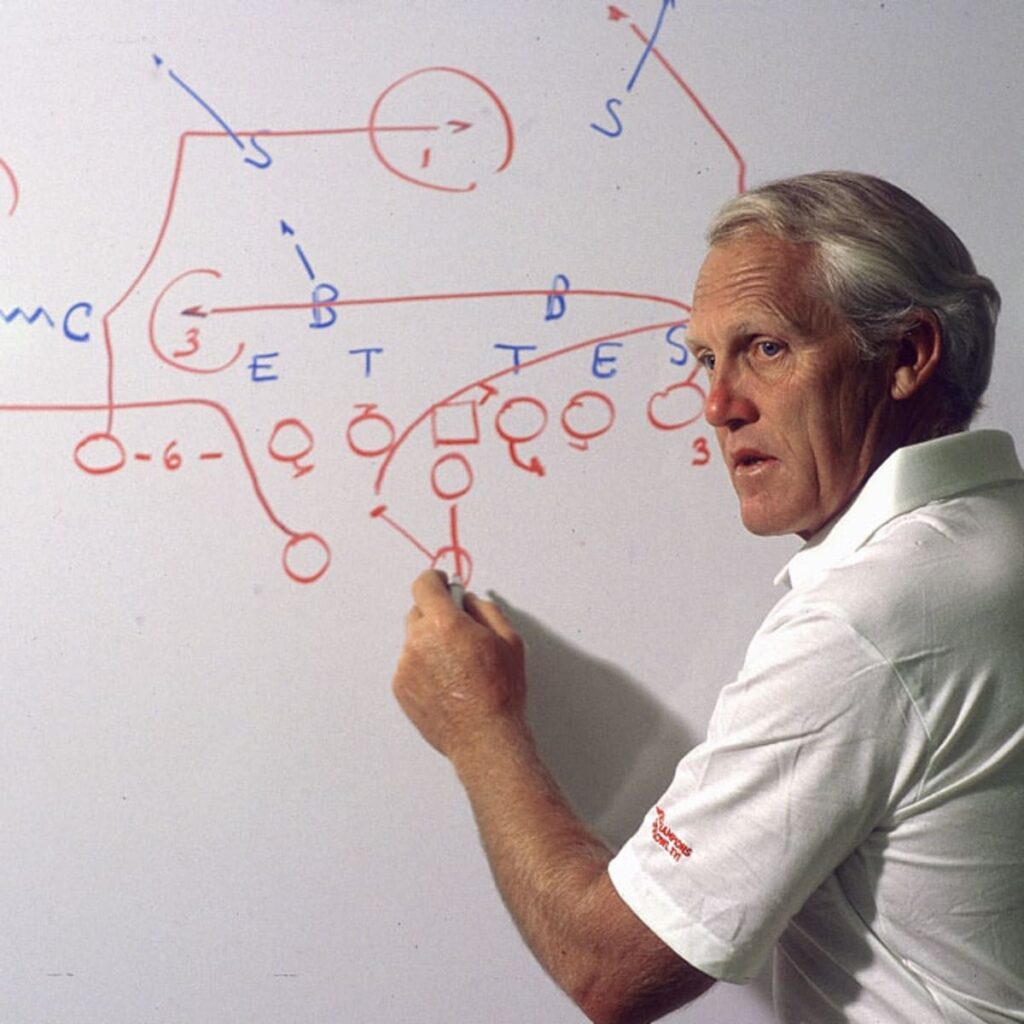
Now, I talked about him briefly yesterday. What I mostly surmised about his coaching background prior to the Niners was that he was working under confirmed megalomaniacs. He joined the expansion Bengals in 1968 as a Wide Receivers coach, and was promoted to Offensive Coordinator in 1971. In that role he developed a system that eventually became the “West Coast Offence”, and turned Ken Anderson into a Hall of Fame considered quarterback. All that did was make Paul Brown mad. He had known Walsh wanted his own team to coach, but didn’t like the apparent lack of loyalty being shown to the man who’d given him that platform.
The ultimate FU from Brown was his resigning as Head Coach and appointing one of Walsh’s subordinates, Bill “Tiger” Johnson, as Head Coach. Of course, the Old Man saw that as simply business, but held a lifelong grudge against Walsh for allegedly breaking his contract and leaving. That’s something Walsh & Weeb Ewbank had in common.
Brown had been called about Walsh’s suitability for the vacant Packers, Rams, and Seahawks expansion jobs, but Brown shittalked him to everyone, trying to punish Walsh for daring to leave. It was the ultimate reason Walsh ended up at Stanford, and how the 49ers zeroed in on him as their new Head Coach & GM in 1979. He managed to survive a couple of 2-14 & 6-10 seasons – results that would have gotten him canned in today’s NFL – and then went 13-3 in 1981, winning the Super Bowl and starting the legend.
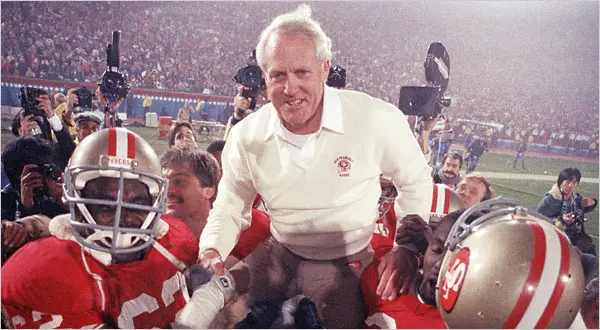
Success on the field led him to give up the GM duties in 1983 to John McVay (Sean’s grandpappy!) Walsh stepped down in 1989, after beating the Bengals in Super Bowl XXIII, cementing his legacy & turning the screws on Paul Brown one last time.
In his time as 49ers Head Coach, it seemed everyone he ever hired was a candidate for a head coaching position. This Wikipedia chart
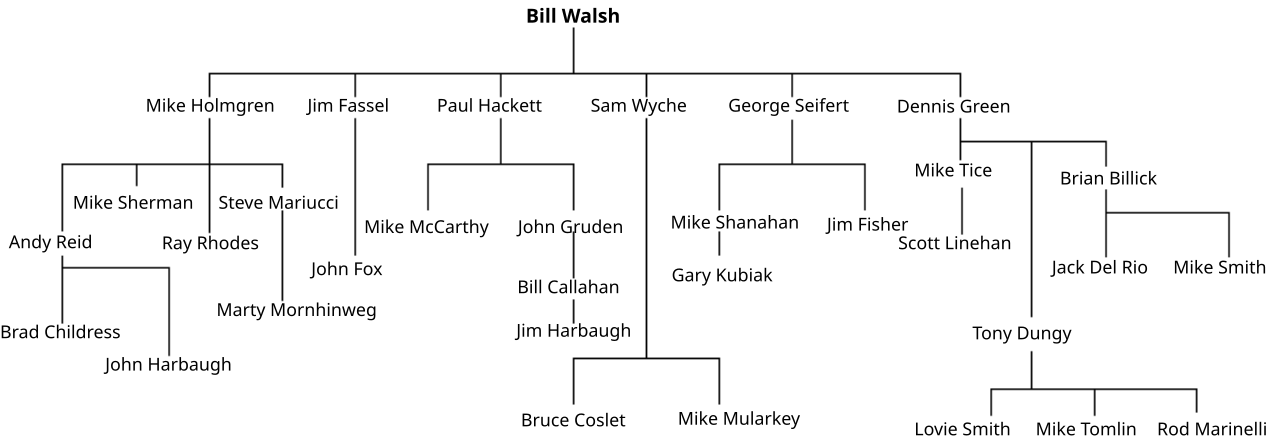
doesn’t really do him justice. Have a click on this Reddit link (absolutely safe for work – I wouldn’t do you like that) to see the full-length version of how many coaches today are the great-grandchildren of this man’s legacy. If you use the Reddit chart, twenty-seven of the league’s 32 teams have or have had a Bill Walsh coach on their team at some point, and 16 of them have won a Super Bowl.
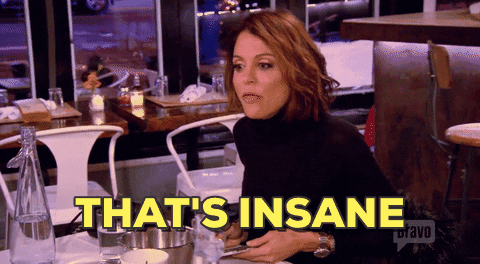
By way of concluding, I’m going to recommend this article, which talks about the process of Bill Walsh writing “Finding the Winning Edge” and Brian Billick’s key role in getting it put together and published. It’s twelve years old, but still says more about coaching football than Josh McDaniels will ever know.
Bill Parcells
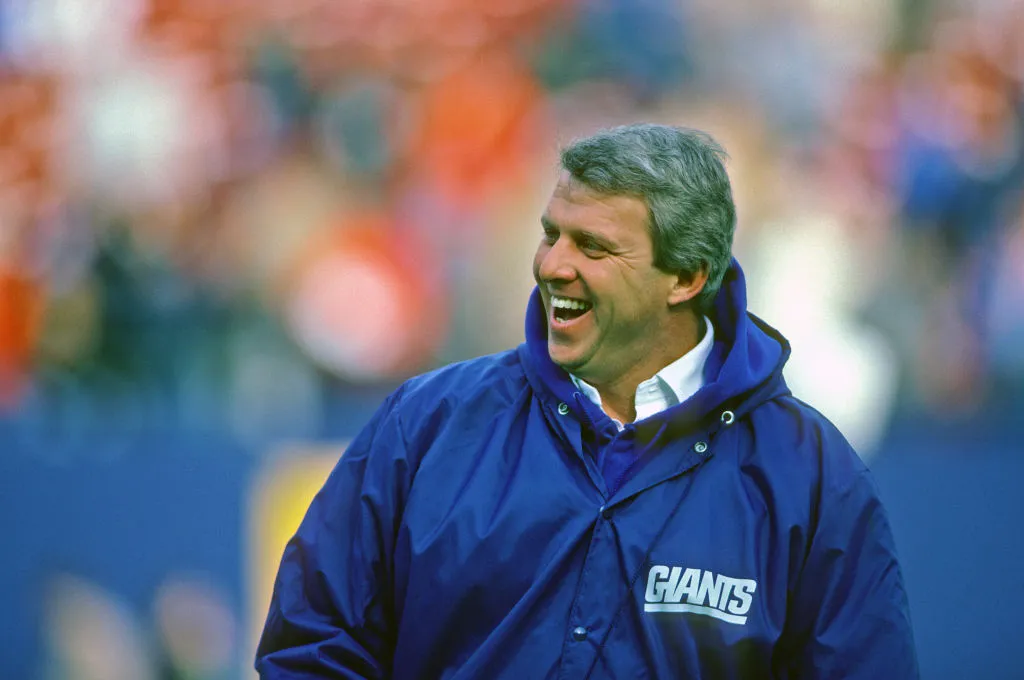
The living example of the idiom “do as I say, not as I do”, Bill Parcells’ NFL history is peppered with stories of him cutting & running from organizations when it suited him but not the team. He was never exactly the person you could build long-term stability around, because you didn’t know how long he’d be around even if he was under contract.
Drafted & dropped by the Detroit Lions in 1964, allegedly by quitting a training camp practice because of the heat, he entered the coaching ranks, rising up through various schools to become the Air Force head coach in 1978.
He initially joined the NFL in 1979, accepting a job with the Giants as offensive coordinator, but resigned six weeks later because his family didn’t want to move from Colorado. This created a reputation for vacillation that followed Parcells throughout his career, as teams never knew when he’d get itchy feet and take off for another job.
He worked for the Patriots in 1980 but then left for the Giants in 1981.
The year he won his first Super Bowl in 1987,

his agent was secretly negotiating for Parcells to leave after the game to coach the Falcons. The negotiations were forcibly ended by Pete Rozelle, but no tampering charges were levied against Atlanta because it was blamed on the agent soliciting interest, not the Falcons hunting for options..
He up & quit the Giants just before the 1991 Draft.
He joined the Patriots in 1993
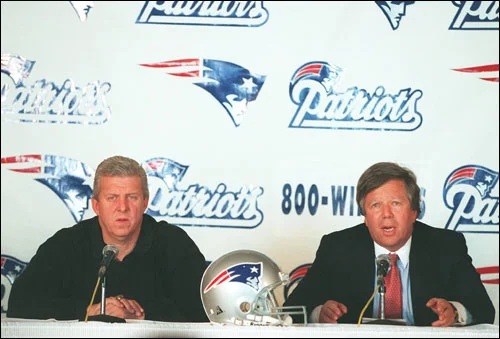
but resigned in 1996, the day after they lost the Super Bowl to Green Bay, in order to become the Jets head coach, an exchange Paul Tagliabue decided amounted to tampering and cost the Jets four draft picks.
He was allegedly supposed to replace Tony Dungy in Tampa in 2002, but Tagliabue intervened again due to tampering allegations – mostly because Parcells was contacting employed coordinators to lure them to join him once he got the job. This is how Jon Gruden ends up winning Tampa’s first Super Bowl, and why Parcells ended up with Dallas in 2003. His last game coaching them was January 6, 2007, the infamous Tony Romo botched snap, and he “retired” three weeks later.
He resurfaced once more in December 2007 to become the Dolphins executive vice president of football operations, less than 24 hours after his negotiations to get the same job with the Falcons fell apart. He signed a four-year contract, but left after three. Story of his life, really.
He also accused Bill Walsh of cheating in a 1985 playoff game against the Giants.
But as a head coach, he also had quite the roster of gentlemen who became influential in league history.

Obviously, we know Grumblelord is the star of the roster, but if you look at the whole tree as presented you have almost a statistical sample for exploring Andrew Carnegie’s three-generations “shirtsleeves to shirtsleeves” curse. Parcells started the business, and then the children made the most of the advantages they were given. Their children grew up spoiled brats, coordinators suckling at the teat of their successful parents. So when they struck out on their own, by the logic of the curse they were doomed to failure. Statistically, only 12% of businesses make it to the third generation; looking at this list, you’ve only got Spags & McDaniels still working with any semblance of success.
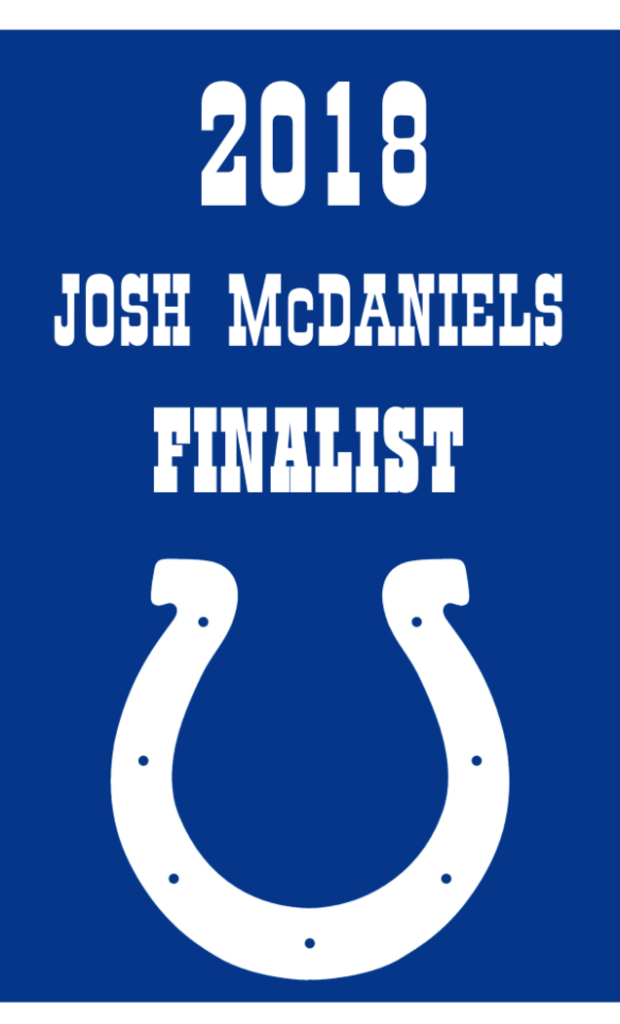
I think we can safely say Bill Walsh is the winner of this battle, and Bill Parcells is lucky anyone still takes his calls.
Tomorrow we will look at the modern variants of the coaching tree. Less history; more hatery.
Tonight’s sports: (all times Eastern)
NHL: (national games; regional blackouts can blow me)
- Minnesota Wild at Boston Bruins – 7:00 PM – NHL Center Ice; Sportsnet
- Edmonton Oilers at St. Louis Blues – 8:00 PM – ESPN+; Sportsnet1
NBA:
- Boston Celtics at Cleveland Cavaliers – 7:30 PM – NBC, TNT; Sportsnet360
- Los Angeles Lakers at Los Angeles Clippers – 10:00 PM – TNT; Sportsnet360
NCAA:
- Kentucky vs. Ole Miss – 7:00 PM – ESPN; TSN2
- New York Knicks at Toronto Raptors – 7:30 PM – TSN
- Baylor at Texas Tech – 9:00 PM – ESPN, ESPN2
In lieu of actual political commentary, here’s yesterday’s tariff bullshit in .gif form,
